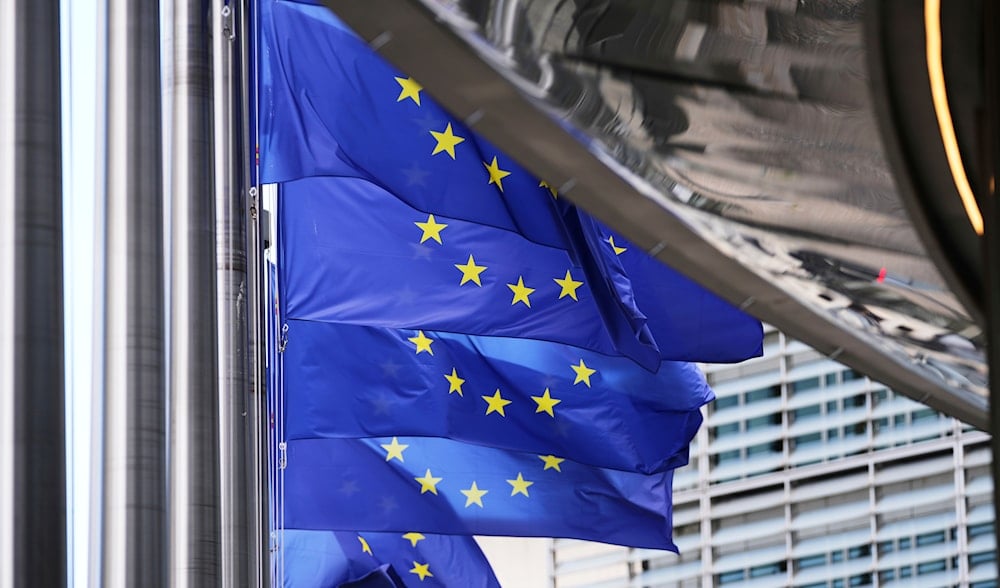Why Europe's regulatory power is no longer enough: FT
As the global landscape shifts from market multilateralism to geopolitical rivalry, the EU's reliance on the Brussels effect may be outdated.
-

European Union flags flap in the wind outside EU headquarters in Brussels, Thursday, Aug. 21, 2025. (AP)
One notable outcome of US President Donald Trump’s recent trade negotiations with the European Commission is what did not materialize, Abraham Newman, a professor at Georgetown University, argues in a new op-ed published in the Financial Times.
In "Europe urgently needs a remedy for the ‘Brussels defect’", Newman says, despite persistent speculation, European officials refrained from softening the enforcement of the EU’s Digital Services Act, which mandates that US tech platforms moderate harmful content. In return, the US sought concessions on tariffs, a bargaining chip that Brussels ultimately refused to play.
While the commission’s stance held firm this time, future threats from Washington are all but certain. Some EU officials may again consider yielding to economic pressure, treating digital protections as negotiable.
This tendency reflects what he coined the "Brussels defect", the belief that global influence is best wielded through market regulations, multilateralism, and technocratic rule-making. This approach now appears increasingly out of step with a world where democracy and national security are at stake, although it was once seen as a strategic strength.
DSA and trade tensions
The European Union has long promoted what it calls the “Brussels effect”, the ability to extend its regulatory frameworks globally by making them the standard for international business. During the height of globalization, this model allowed the EU to transform sensitive political issues, like privacy rights, into technical challenges addressed through corporate compliance. Multinational companies, preferring uniform rules over regulatory fragmentation, largely accepted Europe’s complex standards.
However, the landscape has shifted. Even before the Trump era, this reliance on regulation was losing its appeal. Major American firms, such as Meta and Google, began treating regulatory fines as routine operational costs.
These companies expanded aggressively into new sectors like artificial intelligence and cloud computing, while many European technology firms lagged behind, attributing their struggles to overregulation rather than innovation gaps.
Surveillance capitalism and Europe’s regulatory blind spot
As surveillance capitalism evolved, American dominance in data-driven industries intensified. At the same time, European officials remained focused on enforcing market-based rules, missing broader threats to democracy and digital sovereignty.
This regulatory focus has become a liability, a blind spot, in a geopolitical climate where rules are no longer contested over consumer safety or competition, but over control of information, influence, and ideology.
Some in the US, including voices in Trump’s administration, have explicitly accused the EU’s regulatory framework of being an Orwellian system designed to undermine what they call “western heritage.” These criticisms are part of a broader strategy aimed at pushing Europe toward a model of competitive authoritarianism, using economic pressure to achieve political goals.
From regulation to innovation: A call for EuroStack
To regain strategic autonomy, Europe must reduce its dependence on the American platform economy. Rather than treating digital regulation as a bargaining chip, the EU should prioritize developing homegrown technologies rooted in its democratic values.
One emerging proposal is the creation of a “EuroStack”, a vertically integrated digital ecosystem built from European-made semiconductors and AI infrastructure up to user-facing platforms.
Such a system would not only strengthen Europe’s technological base but also signal a shift away from dependency on external powers. It presents an opportunity to reframe the EU’s digital agenda around innovation rather than regulation, reasserting democratic control over technology.
Escaping the Brussels defect
The decline of the Brussels effect highlights the urgent need for Europe to evolve. Relying solely on regulatory influence in a world shaped by national security concerns and ideological conflict is no longer sustainable. The Brussels defect, the tendency to see all global problems through the lens of market governance, has become a strategic weakness.
To address this, Newman suggests that the EU must invest in technological self-sufficiency and reassert its values through innovation.
Proposals like EuroStack provide a clear path forward. The sooner European officials acknowledge the limitations of their current approach, the better positioned the continent will be to defend both its economic interests and democratic principles, he concluded.
Read more: US-EU trade deal draws EU criticism over inequality, subjugation

 4 Min Read
4 Min Read










